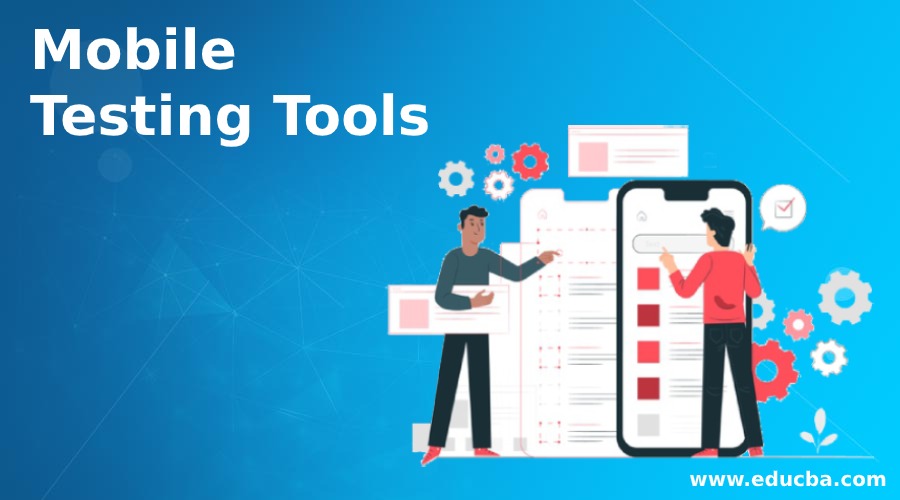Updated April 3, 2023

Introduction to Mobile Testing Tools
Automated tools are currently needed for any testing of a mobile device. Properly organized automatic testing can reduce testing time and the likelihood of human errors in the testing process. There are countless research methods available for mobile automation. Some are free. Some of these automation tools have long since been created, while others have recently become available. Each tool is special and has some features. A wide range of automation tools make selecting the best one for a project difficult and often testing tools do not meet project requirements.
Various Mobile Testing Tools
Now we will see various Tools which are as follows:
Kobiton
With support for multitouch gestures, orientation and GPS tests, camera/layer control and system link management, Kobiton provides users with complete control of actual mobile devices during manual testings. Kobiton documents all activities performed during the testing session with automatically created activity reports, so that problems are detected and resolved more rapidly. Users can buy prepaid test minutes, which will never expire for $10.
Features of Kobiton:
- Internal Device Test Management uses internal tools more efficiently.
- Simplified user interface for the simplification of assessments.
- Centralized test history and shared data logs.
- The most recent actual, cloud-based devices and settings.
Squish ByFrogLogic
You will solve the difficulties of mobile check automation with Squish for Android and Squish for IOS. Squish offers automated testing of desktop, desktop and native apps and a mix of the two. Thanks to Squish precise and stable object recognition methods Squish can run experiments on mobile device emulators and various real devices without modification. Unlike many other testing tools, Squish does not require a machine jailbroke or rooting. You can immediately start automated graphical testing of your mobile application.
Features of squish By Froglogic:
- Help for advanced acts.
- Web-based web support.
- Integration of IC and source regulation
HeadSpin
HeadSpin gives businesses a real-world, user-active insight into mobile success. HeadSpin will provide you with a comprehensive insight into successes and user interface problems on all layers of the mobile stack-from the clients up to the servers-to tackle the complexities of consumer interactions in the dynamic mobile world.
Features of HeadSpin:
- Hundreds of real apps worldwide at more than 150 locations.
- AI engine handles performance problems automatically from the greatest to the least effect.
- Connection available for reserved shared or pay-as-you.
- App uptime of 100%.
- Visibility before and after launch.
Appium
Appium is an open-source and supports Android from 2.3 onwards as a cross-platform test automation tool for the hybrid and native iOS. Appium acts as a context server like a selenium server. It supports several languages, including C#, Ruby, Java, etc., which are contained in the library of the WebDriver. Appium uses WebDriver to automatically run Appium’s Android interface using Google’s UIAutomator library as part of Android’s SDK. Safari and Chrome can be managed on mobile devices. The software system TestNG can be synchronized. In this case, UI Automator may report informatively and in-depth similar to reports.
Features of Appium:
- You do not have to change or recompile your device in any way due to the use of standard automation APIs on all platforms.
- Supports PHP, Java, Ruby, Node, and Python for various languages
- No mobile apps have to be re-compiled on another platform.
- It can be combined with other instruments with the aid of Java.
monkeyrunner
monkeyrunner tool offers an API to type programs managed from outside Android code by a computer or emulator. This device is developed after performance robotics. The tests are written in Python and you can use a recording tool to build tests. MonkeyRunner’s only set-back is that scripts for each device need to be written and tests require adjustments every time the test program’s user interface is changed.
Features of MonkeyRunner:
- To simplify research you don’t have to manage the source code.
- Python allows the API to communicate with the Android app.
- This can be used for practical automated testing.
KIF
KIF is objective C-based and for automated IOS testing exclusively. Kif is a platform for automation that explicitly interacts with XCTests. This can be used when business people can not read or write test specs.
Features of KIF:
- It is simpler for pure iOS developers to pick up anything in one language, objective C.
- KIF uses its usability labels to control UI elements.
- Its command-line and CI are impressive.
Testdroid
Testdroid is a mobile device development platform built in the cloud that lets developers save on the cost of creating the software, boost product marketing, and lower volatile operating costs. This is your fastest way to test your software on many real iOS and Android devices with different HW Screen, platform, resolution and OS launch. The price range depends on the demand between $499 and $4999 per month. It’s one of the popular iOS and Android mobile game review sites. It enables manual remote access to more than 300 real Android devices before an app begins.
Features of Testdroid:
- Reduces the possibility of actual systems and agile research.
- Enhance device ranking and active regular users.
Conclusion
In this article we have seen what is Mobile Testing and what are various tools available to perform mobile testing. You can choose any of the tools based on your needs.
Recommended Articles
This is a guide to Mobile Testing Tools. Here we discuss an introduction to Mobile Testing Tools, Various Testing Tools with explanations and features. You can also go through our other related articles to learn more –
